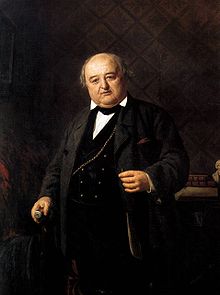Mikhail Shchepkin Михаил Щепкин | |
|---|---|
 Portrait by Nikolai Nevrev | |
| Born | 17 November [O.S. 6 November] 1788 Krasnoe, Kursk Province, Russian Empire |
| Died | 11 August [O.S. 23 August] 1863 (aged 74) Yalta, Russian Empire |
| Occupation | Actor |
| Language | Russian |
| Nationality | Russian |
| Period | 19th-century theatre |
| Literary movement | Realism |
| Years active | 1805—1863 |
| Notable work | Memoirs |
Mikhail Semyonovich Shchepkin (Russian: Михаи́л Семёнович Ще́пкин; 17 November [O.S. 6 November] 1788 — 11 August [O.S. 23 August] 1863) was the most famous Russian Empire actor of the 19th century. He is considered the "father" of realist acting in Russia and, via the influence of his student, Glikeriya Fedotova, a major influence on the development of the 'system' of Konstantin Stanislavski (who was born in the year in which Shchepkin died).[1] Shchepkin's significance to the Theatre of Russia is comparable to that of David Garrick to the English theatre.[2]
He distinguished between two kinds of actors, both of whom are dedicated to the art of acting: (1) those who have developed the art of pretense based on intelligence and reason; (2) those who express feelings experienced by the actor in performance and work based on "a flaming-soul, heavenly spark." Shchepkin considered the effect of the latter approach superior to that of the former.[3] He was opposed to the principles advanced by the French playwright and philosopher Denis Diderot in his Paradox of the Actor (published posthumously in 1830), which inverted Shchepkin's evaluation.[4]